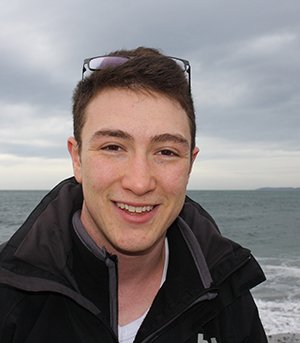From Rural England to Urban Seattle with NRSA Funding to Support our Visual World
 |
Kit Moreland (Cognition & Perception graduate student working with Geoff Boynton) is our latest student to receive predoctoral funding from NIH (NRSA, or National Research Service Award) for his research on divided attention. The background of this research award was covered in a previous article. Learn more about Kit below!
Let's start with the basics: where are you from and where did you complete undergrad and masters?
I am from rural Northumberland in the North East of England. I did my undergraduate at the University of Glasgow and a masters at the University of Oxford.
How did you wind up at UW and why did you apply here?
I was interested in doing a longer PhD in the US as opposed to three years in the UK so I started looking into labs and the Vision and Cognition group looked very interesting to me so it got on my short list. After a very fun series of interviews over Skype it was very clear we had a good fit so UW became my top choice.
What is your research interest and how did you get into it?
I am interested in how the brain selects information from the visual world and then from this limited information creates our perception of the world. I am constantly amazed that we have such the rich illusion that we see everything, when in reality this is far from the truth. I was introduced to perception during undergraduate lectures and very quickly joined a lab for a summer project, and then never left the field. Vision is itself interesting but more than that it is one of the best understood areas of the brain and one which we have most ability to give input which makes it an excellent model system to study broader psychological and neuroscientific concepts.
How did you feel when you learned that your application was accepted?
Firstly, we had not heard for such a long time we assumed we had not been funded and were deciding when to resubmit. Fortunately, we agreed to postpone for two deadlines. I then received a highly ambiguous email and it was several weeks later and after sending many documents back and forth that it was confirmed. There was not really one moment in which I knew I had been successful. Of course, I was still very excited. It is very motivating to know that someone out there values your work and wants it to happen.
What is the name of your project?
Computational and neural mechanisms of divided attention in vision.
How might your research change the world?
My research is about divided attention. That is, to what extent are we able to do two things at once, and what kinds of things can we do at once without a cost? This has broad impacts for many tasks, such as driving. For example, imagine if we knew the best layout for dashboard information to allow you to take the least amount of time with your eyes off the road.
Do you have any advice/tips/suggestions for others who may apply to this opportunity? About graduate study in general?
Start writing early and focus on the documents related to training. They should not be taken lightly. Pay attention to your formatting, it should be easy to read and even attractive. Ask to borrow some successful examples and their reviewer’s comments. Try to understand why they were successful and copy them.
What do you hope to accomplish with the funding and/or while in the UW Psychology graduate program?
I hope to complete a series of behavioral experiments and move on to learning a new skill in fMRI. The funding will also allow me to travel for conferences to communicate my research findings. I hope to write 2-3 papers on the grant topic.
Supplemental Reading: